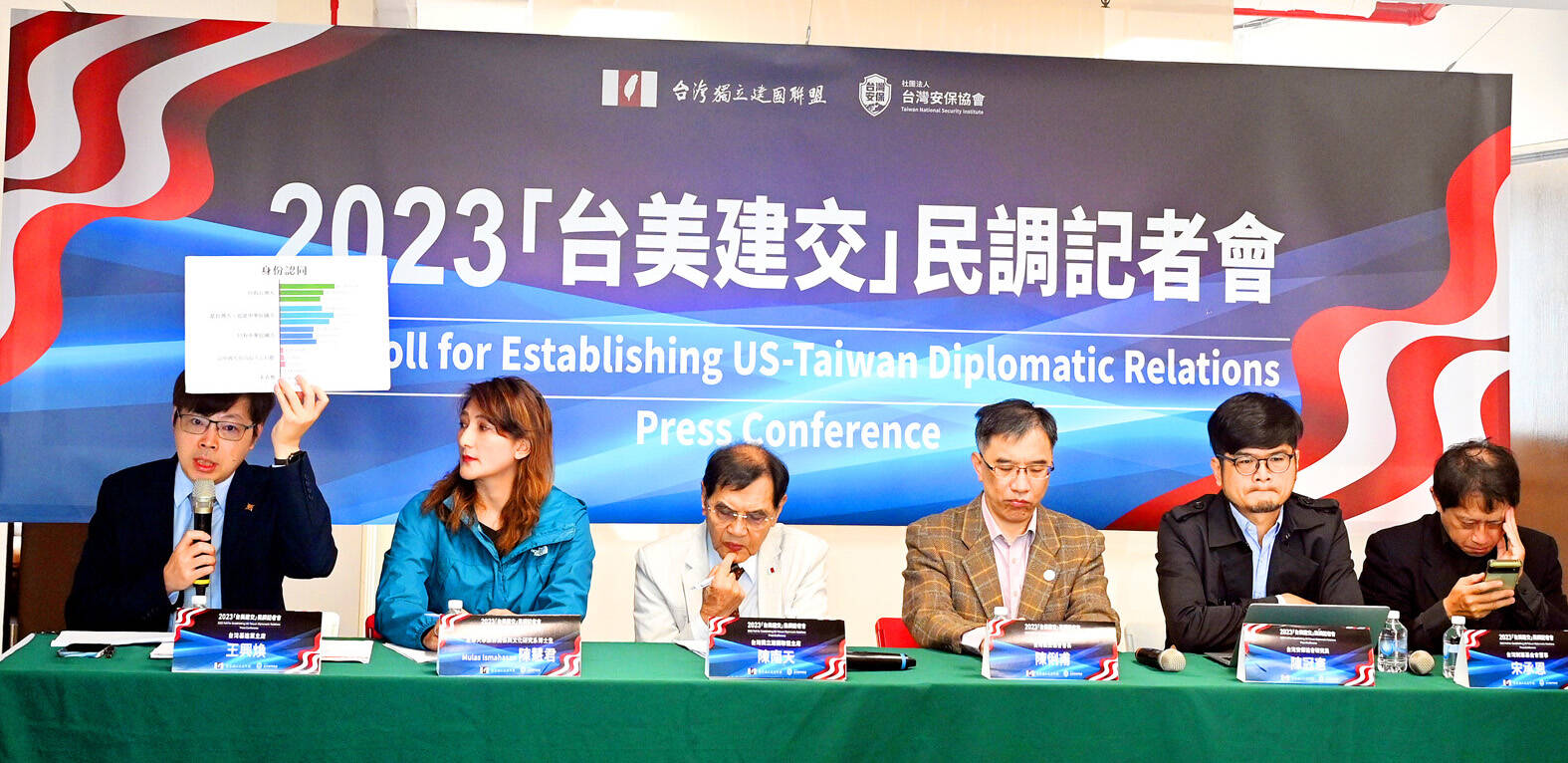Public support for maintaining the “status quo” forever across the Taiwan Strait has been growing over the past three years, a survey released yesterday showed.
Asked about their view on Taiwanese independence or unification with China, 44.3 percent of respondents supported “forever maintaining the status quo,” up from 42 percent and 40.8 percent last year and 2021 respectively, a poll by the World United Formosans for Independence and the Taiwan National Security Association showed.
Only 3.8 percent of respondents supported “independence as soon as possible,” while 0.7 percent supported “unification as soon as possible,” it showed.

Photo: Wang Yi-sung, Taipei Times
The trend suggests that Taiwanese have become “more conservative” amid heightened tensions across the Taiwan Strait and around the world, said Chen Kuan-hsien (陳冠憲), a researcher at the association.
Another 35.8 percent of respondents supported “maintaining the status quo while working toward independence,” down from more than 40 percent in the past two years, while 11.5 percent supported “maintaining the status quo while working toward unification,” an increase from lower than 10 percent in the past two years, it showed.
The results align with changes in respondents’ perceptions about identity — fewer people identified as “only Taiwanese” and more identified themselves as “only citizens of the Republic of China,” Taiwan Statebuilding Party chairman Wang Hsing-huan (王興煥) said.
Taiwan New Constitution Foundation deputy director Sung Cheng-en (宋承恩) warned that China is determined to “take back” Taiwan and is focused on political warfare and propaganda to influence Taiwan’s elections in January.
Beijing’s attempts might include increasing its political and economic pressure on Taiwan and using the Internet to sway public opinion, he said.
China is “nurturing political agents” in Taiwan to help spread US skepticism narratives or rumors that the Taiwanese economy is reliant on China and that China’s system is superior, he said.
Asked whether the government should pro-actively advocate for establishing diplomatic relations with the US, 29.5 percent of respondents strongly agreed, 17.9 percent moderately agreed and 30.5 percent took a neutral stance, the poll showed.
On forming a military alliance with the US, 41.8 percent of respondents strongly agreed, 17.5 percent moderately agreed and 21.3 percent took a neutral stance, it showed.
The Focus Survey Research was commissioned to conduct the survey, collecting 1,084 valid samples from Monday to Wednesday last week, half by landline and half by mobile phone.
It had a confidence level of 95 percent and a margin of error of plus or minus 2.98 percentage points.

TRUST: The KMT said it respected the US’ timing and considerations, and hoped it would continue to honor its commitments to helping Taiwan bolster its defenses and deterrence US President Donald Trump is delaying a multibillion-dollar arms sale to Taiwan to ensure his visit to Beijing is successful, a New York Times report said. The weapons sales package has stalled in the US Department of State, the report said, citing US officials it did not identify. The White House has told agencies not to push forward ahead of Trump’s meeting with Chinese President Xi Jinping (習近平), it said. The two last month held a phone call to discuss trade and geopolitical flashpoints ahead of the summit. Xi raised the Taiwan issue and urged the US to handle arms sales to

A magnitude 5.6 earthquake struck off the coast of Yilan County at 12:37pm today, with clear shaking felt across much of northern Taiwan. There were no immediate reports of damage. The epicenter of the quake was 16.9km east-southeast of Yilan County Hall offshore at a depth of 66.8km, Central Weather Administration (CWA) data showed. The maximum intensity registered at a 4 in Yilan County’s Nanao Township (南澳) on Taiwan’s seven-tier scale. Other parts of Yilan, as well as certain areas of Hualien County, Taipei, New Taipei City, Taoyuan, Hsinchu County, Taichung and Miaoli County, recorded intensities of 3. Residents of Yilan County and Taipei received

Taiwan has secured another breakthrough in fruit exports, with jujubes, dragon fruit and lychees approved for shipment to the EU, the Ministry of Agriculture said yesterday. The Animal and Plant Health Inspection Agency on Thursday received formal notification of the approval from the EU, the ministry said, adding that the decision was expected to expand Taiwanese fruit producers’ access to high-end European markets. Taiwan exported 126 tonnes of lychees last year, valued at US$1.48 million, with Japan accounting for 102 tonnes. Other export destinations included New Zealand, Hong Kong, the US and Australia, ministry data showed. Jujube exports totaled 103 tonnes, valued at

BIG SPENDERS: Foreign investors bought the most Taiwan equities since 2005, signaling confidence that an AI boom would continue to benefit chipmakers Taiwan Semiconductor Manufacturing Co’s (TSMC, 台積電) market capitalization swelled to US$2 trillion for the first time following a 4.25 percent rally in its American depositary receipts (ADR) overnight, putting the world’s biggest contract chipmaker sixth on the list of the world’s biggest companies by market capitalization, just behind Amazon.com Inc. The site CompaniesMarketcap.com ranked TSMC ahead of Saudi Aramco and Meta Platforms Inc. The Taiwanese company’s ADRs on Tuesday surged to US$385.75 on the New York Stock Exchange, as strong demand for artificial intelligence (AI) applications led to chip supply constraints and boost revenue growth to record-breaking levels. Each TSMC ADR represents